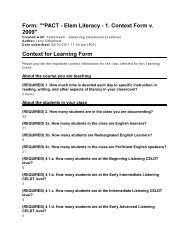The Tutoring Book - California State University, Sacramento
The Tutoring Book - California State University, Sacramento
The Tutoring Book - California State University, Sacramento
You also want an ePaper? Increase the reach of your titles
YUMPU automatically turns print PDFs into web optimized ePapers that Google loves.
Do You Understand Me?<br />
92<br />
Manny Galvan<br />
Spring 2011<br />
Before working in the writing center I had many misconceptions of what the writing center does<br />
and who I was as a future tutor. I decided not to take this course until the end of my graduate studies<br />
because I did not feel prepared to help others with their papers and writing process. I did not see myself as<br />
an “expert” in the field of composition, and I was afraid that I would do more harm than help to any tutee<br />
that would come in. Thus, during our “boot camp” I took many notes, learned the “language” of tutors,<br />
and even took on the persona of an expert compositionist. I remember the first time that I sat down with a<br />
tutee – It was a disaster. I spent much of the time in our session validating who I was as an English major<br />
as I spouted off current composition theory, grammatical technicalities, and MLA structure. Now that I<br />
think of it, I don’t remember the student, their writing process, or even their paper. All I know is that I<br />
never saw that student again. I can only hope that something that I said during our hour session was<br />
helpful, but I often think that I couldn’t communicate because I wasn’t speaking their “language.”<br />
I share this story with you because as you may already know (or will learn later in the semester)<br />
each individual belongs to different discourse communities. Tutors are expected to be in the discourse<br />
community that has a working understanding of the English language and the writing conventions that we<br />
use. <strong>The</strong> prerequisites of 195A/410A, that you have already completed, prove that you are a part of this<br />
discourse community, and that you are prepared and apt to be a tutor. This discourse community has<br />
developed its own language based off the readings of Friere, Delpit, Elbow, etc. and is easily understood<br />
within our discourse community; however, outsiders may not understand what we are talking about. I<br />
learned the hard way that not every student knows this “language” or even cares to understand. Rather,<br />
they merely want help with their paper, and in turn becoming a better writer.<br />
It took me weeks to learn my identity as a tutor and how I could best help the tutees benefit from<br />
our sessions. I learned that before I could expect them to speak and understand that “language” that us<br />
tutors and compositionist use, I had to take the time to understand the tutee’s language. I now begin my<br />
tutoring sessions by simply asking questions about the student and what they are interested in. Students<br />
seem to be very surprised when I begin our tutoring sessions by placing the paper to the side, and begin<br />
asking questions as to who they are as a person before I approach who they are as a writer. After spending<br />
some time getting to know the tutee and the “language” that they speak I am able to adjust my “language”<br />
to help them with their writing process.<br />
I remember a recent interaction with a student athlete who came in for help with annotations and<br />
reading strategies. I shared with him some pre-reading strategies and gave him some helpful hints of what<br />
to annotate and why we annotate. He still didn’t understand the benefit to all of this and it took me a while<br />
to make a connection for him. Because I took the time to learn that he was a student athlete I was able to<br />
show him that some pre-reading strategies were similar to stretching before a game. I told him that if he<br />
wanted to do well in the game, he had to warm his body up. Similarly, if he wanted to do well with his<br />
reading strategies he had to warm his brain up to take in all the information. I still meet with that student<br />
and from time to time he mentions that his reading comprehension has grown now that he understands<br />
why it was important to “warm up.”<br />
Similarly, I had an ESL student come into the writing center wanting help with his paper. He<br />
merely wanted me to look over his paper, because his teachers had told him that he had many repeat<br />
errors. After hearing the frustration in the student’s voice I began asking him about his heritage and how<br />
he felt about his writing process. He told me that Russian was his first language and that getting bad<br />
grades in writing was a new thing for him because he was a top student in Russia. After glancing over his<br />
paper, I immediately saw that he was struggling with articles. I asked him about Russian writing and he<br />
told me that they simply omit articles before a noun. After learning this important piece of information,<br />
we were able to work on his writing process as a whole while addressing his specific need to understand<br />
articles.

















